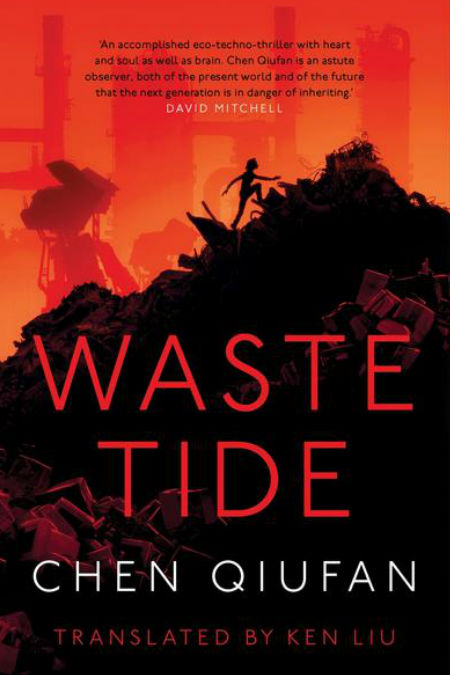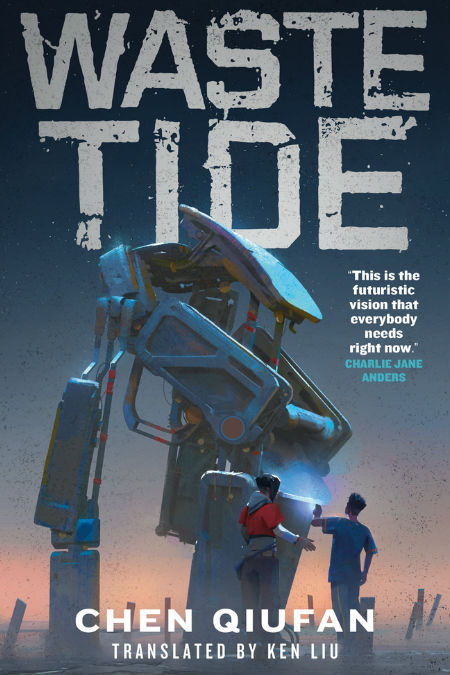
Humanity, well most of us anyway, like to think of ourselves as a laudably progressive lot, constantly pushing up living standards, lengthening lifespans and generally behaving ever more like the inclusive, caring, beautiful people we like to think we are.
But as Chen Qiufan’s magnetically-readable novel, Waste Tide (translated by Ken Liu), graphically and movingly portrays, this idea of the promised land made flesh is more of a first world bubble conceit, a paper-thin construction that falls apart quickly when you dig not to far beneath of the surface of our supposedly brave, new squeaky, shiny world.
On Silicon Isle, somewhere off the southern coast of China, e-waste flowing from a number of the world’s buoyantly-rich economies such as the United States, end up in the once-beautiful location where immigrants from across the country work hard sorting through all kinds of hazardous material for very meagre returns.
They make a living, just, but it’s a life marred by violence, rampant ill-health, repression and a sense of powerlessness, which no one can really challenge in any meaningful way since they depend on this hell on earth for their livelihood.
There is some sense of community, and many hang onto their old traditions to keep a hold of some sense of identity and place, but it’s a losing battle with powerful local forces, gangs and multinational companies all seeking a slice of, what is for them, a lucrative endeavour and eco-terrorits maneuvering to upset this toxic applecart for their own flawed ends.
“‘The greatest hope cherished by the people of Silicon Isle is to see their children leave this place, the farther the better. We’re old and can’t shift from our familiar nests, but the young are different. They’re blank sheets of paper, full of potential for new pictures. This island has no hope. The air, the water, the soil, and the people have been immersed in trash for too long. Sometimes you can no longer even tell what’s trash and what’s not in our lives. We rely on waste to feed our families, to grow rich. But the more money we make, the worse the environment becomes. It’s like we are holding on to a rope looped around our necks. The harder we pull, the less we can breathe. But if we let go, we’ll fall into the bottomless pit below and drown.'” (P. 27)
Into this mix of brutal grim reality and hopes and dreams – somehow they endure despite a world where both idealistic commodities are in short supply – comes Mimi, a recent immigrant from rural China, who finds herself, like so many others on the bottom rung of society, at the mercy of the ruling clans who enforce their will with mafia-like ruthlessness and who are close to signing a deal with a major US recycling company TerraClean (green names, black dealings seem to be the name of the game) which could dramatically change the landscape of Silicon Isle.
But of course, it won’t be the people knee deep in the rubbish pits who will come out on top in this deal.
While the proponents of the deal, including TerraClean’s corporate mercenary for hire, Scott Randle, accompanied by Silicon Isle expat (raised in Boston, Mass.) made good, Chen Kaizong, who is increasingly uneasy about what the multinational company has in store for his home island, preach economic enrichment, land rehabilitation and a bright future for all, the reality is that the rich will get richer, and the poorer will be ground into a filthy, horrific world that will kill them long before they see any benefits, assuming they arrive at all (unlikely).
But as tyrants and oppressors down through history have found to their cost, you can only repress people for so long before something has to give, and Silicon Isle, on the verge of reinvention, is there, a tinderbox waiting for one solitary flame to set it alight.

It is not a situation ripe for a happy ending, and while Qiufan does draw some moments of tenderness, love and beauty from his grimly realistic tale, especially the connection that develops between Mimi and Zaidong, and there are moments of true epiphany for many of the characters, the truth is that the real world is not all that accommodating of fairytales and their attendant, red bow-tied finishes.
In prose that is exquisitely well-crafted, at times and always accessibly knowing Quifan brilliantly illuminates the depths of the belly of the beast that is capitalism and consumerism, not in some haranguing polemic way but with a personal focus that emphasises how only a few benefit from the current system and so many, the vast majority, do not.
It’s a powerful way to get this important message across, not with a litany of statistics or barb-laden arguments, but with the simple recounting of how one man’s trash becomes another man or woman’s killer, oppressor and denier of hoped-for opportunities.
Quifan adds to this already potently personal mix with some judiciously-used magical realism that heightens the truth of his words in ways that are shocking yet whimsical, overpowering but intimately reflective.
“At first, the waste people from nearby shacks watched warily, but gradually, they emerged from their homes and stood behind Mimi. Their faces were resolute with anger, and the electronic accessories on their bodies glowed only faintly due to short circuits from the rain. Like statues, they stared at Luo and his men, the recycled prostheses on their bodies glinting with a crude light. They were like a long-dormant volcano that possessed great energy, just waiting for the moment of eruption.” (P. 302)
Waste Tide thus becomes that rare book with a salutary message – awash in some dark home truths about the world around us but told in such a way, such an intensely humanly affecting way, that you cannot help but be deeply affected by the story he tells.
You cannot walk away from this immersive book, unless your heart is made of concrete without ruminating on how your actions, seemingly innocent things like trading up to a new mobile phone or taking advantage of a new medical treatment, can have a profound effect on people thousands of miles away.
Ours is a globalised world and washing our hands of the consequences of our lifestyle and the economic, social and political systems that enable it, is simply no longer an option when you have read a book like Waste Tide, which doesn’t pretend for one red hot, toxically-impactful minute that everything is fine just below the surface of modern society.
As the lives of the major characters in this singularly-extraordinary book make abundantly clear – we may hope for the very best for ourselves and humanity as a whole, but the reality is that we are a long still from the promised land of our dreams and have a lot to deal with if we are ever going to get anywhere near it.
